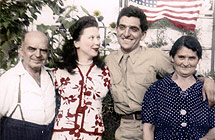During the first week of April 2009, the commander of Navy Medicine West, based in San Diego, California, received a troubling message from the local Navy Research Laboratory. The lab had analyzed a mucus sample from a 9-year-old girl with flu symptoms and discovered a strain of the virus that was previously unknown. Two weeks later, the country learned to fear the "swine flu," or H1N1 influenza virus. Fortunately, the commander had previously led the development of Navy Medicine's pandemic flu response plan, and so her team was able to quickly recognize the severity of the threat and notify the Centers for Disease Control. The commander's name was Christine Hunter (CAS'80, MED'80).
Nearly five years earlier, on the day after Christmas, 2004, a magnitude 9.3 earthquake struck off the coast of Sumatra, Indonesia. Soon afterward, the chief of staff at the Navy's Bureau of Medicine and Surgery in Washington, D.C., received a call from the Naval Operations Center informing her that the resulting tsunami had killed tens—and perhaps hundreds—of thousands of people in coastal areas across the Indian Ocean (the death toll would eventually exceed 230,000). The Navy would need to devise a response immediately. The chief of staff's name was Christine Hunter.
So how did Hunter, a graduate of BU's accelerated six-year BA/MD program, wind up playing a key role in responding to two of the biggest international medical crises of the past decade?

Rear Admiral Christine Hunter receives a Distinguished Alumni Award from President of the BU Alumni Association Dave Hollowell (ENG'69, '72; GSM'74), at an awards ceremony last October.
Photo by Vernon Doucette
Back on campus to receive a Distinguished Alumni Award during Alumni Weekend last October, Hunter, now a rear admiral, has a knack for channeling all of her sizeable talents into the work at hand—a trait that has steadily earned her promotions to positions of greater and greater responsibility within the Navy. Everywhere she goes, it seems, she improves the way that things are done.
Hunter's Navy résumé reveals the many ways she has transformed medical care and increased access to it for military personnel—young and old, families and retirees, and those wounded in battle. During the mid-1990s, while medical services director at the Naval Medical Center San Diego, she revamped primary care services and created a plan to enable seniors to supplement their Medicare with TRICARE, the health insurance plan for service members. In the early 2000s, at the Naval Hospital Bremerton in Washington State, Dr. Hunter turned her attention to improving patient access for families by overseeing the addition of a new Family Care Center. Her next chapter was at sea, caring for wounded military personnel. As Pacific Fleet Surgeon, in 2003–2004 she pioneered new surgical techniques aboard small combatant ships—these were adopted as the prototype for the Expeditionary Resuscitative Surgical System used today. When she returned to the Naval Medical Center San Diego in 2007, she continued her focus on the wounded, developing highly acclaimed medical programs for amputee care, combat stress control, and traumatic brain injury. Today, Rear Admiral Hunter coordinates health care for 9.6 million beneficiaries around the globe as director of the TRICARE Management Activity.
In part, Hunter attributes her readiness to handle any new situation to her CAS training. "When I got to BU, I think the most important thing that I learned was critical thinking," she says. "As I look back on it, that's often what I bring to the situation. I don't bring the deepest subject-matter expertise in pandemic flu or in tsunamis or in running a hospital or running a health plan, but I bring a way to integrate the skills of the organization so that we can all move forward together."

Photo by Matt Kalinowski for BU Photography
Probably the biggest crisis she ever faced was the tsunami aftermath. During that tragic 2004 holiday season, Hunter and her colleagues quickly put together a novel plan to augment the staffing of Navy hospital ships with onboard nongovernmental aid agencies. Normally, such collaboration between the Navy and NGOs would have taken a year of planning, but, given the dire circumstances, they cut through the red tape and launched a ship within days. The collaboration was so successful that it became a model for future disaster responses, including the one following last year's devastating earthquake in Haiti.
Hunter's brief visit to BU in the fall mirrored typical days in her professional life. She spent her time taking in new data, holding deep discussions with others in her field, and letting these inputs spark new ideas. In the morning, she participated in meetings on post-traumatic stress and chronic traumatic encephalopathy research, where she gained some new insight into how the Military Health System could tackle the problem of suicide by looking more closely at service members with a history of concussions.
"I got very excited in the conversations we were having," she said during an interview following a symposium. "Maybe we need to look at autopsy data in service members who committed suicide to try to see if we can identify neuroanatomical brain changes similar to those seen in athletes with repeated concussions. Somewhere in there is going to be an overlap group where maybe there was a subclinical concussion or more than one, and that helped that threshold to be breached for suicide."
Characteristically, there was no leisurely ending to her day's activities, no sense that now, with this latest award, Hunter could rest on her laurels. There was just her excitement about how she could apply what she had learned during the day to what she would do the next day. ■




